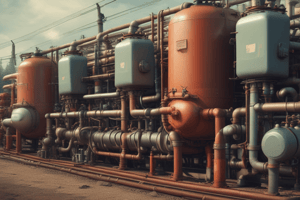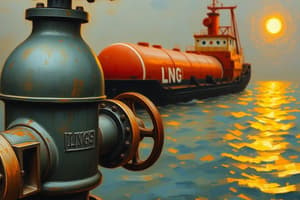Podcast
Questions and Answers
What is the primary risk associated with LPG being heavier than air?
What is the primary risk associated with LPG being heavier than air?
- It is less likely to ignite than lighter gases.
- It can displace oxygen in low areas. (correct)
- It causes immediate respiratory effects.
- It can cause burns upon contact.
Which of the following is NOT a recommended safety measure for storing LPG cylinders?
Which of the following is NOT a recommended safety measure for storing LPG cylinders?
- Keep cylinders away from direct sunlight.
- Store cylinders upright.
- Store cylinders in confined spaces. (correct)
- Use protective caps when not in use.
What is the first step to take in case of an LPG leak?
What is the first step to take in case of an LPG leak?
- Stay in the area and monitor the situation.
- Use electrical equipment to check for leaks.
- Turn off the gas supply and ventilate the area. (correct)
- Ignite the area to burn off the gas.
Why is it essential to have trained personnel handle LPG systems?
Why is it essential to have trained personnel handle LPG systems?
What method can be used to check for LPG leaks?
What method can be used to check for LPG leaks?
Which of the following is a safe practice when transporting LPG cylinders?
Which of the following is a safe practice when transporting LPG cylinders?
What type of equipment should be avoided near a suspected LPG leak?
What type of equipment should be avoided near a suspected LPG leak?
What should you do if someone suffers from asphyxiation due to LPG exposure?
What should you do if someone suffers from asphyxiation due to LPG exposure?
Flashcards
What is LPG?
What is LPG?
A flammable mixture of hydrocarbon gases, mainly propane and butane, used for heating, cooking, and in industry.
LPG vapor behavior
LPG vapor behavior
LPG vapors are heavier than air and can collect in low areas, creating fire and suffocation risks.
Safe LPG cylinder storage
Safe LPG cylinder storage
Store upright in ventilated areas, away from heat and sunlight, using protective caps when not in use.
LPG Leak Detection
LPG Leak Detection
Signup and view all the flashcards
LPG leak emergency steps
LPG leak emergency steps
Signup and view all the flashcards
LPG Transportation Guidelines
LPG Transportation Guidelines
Signup and view all the flashcards
First aid for LPG burns
First aid for LPG burns
Signup and view all the flashcards
First aid for LPG asphyxiation
First aid for LPG asphyxiation
Signup and view all the flashcards
Study Notes
LPG Safety
General Information
- LPG (Liquefied Petroleum Gas) is a flammable mixture of hydrocarbon gases, primarily propane and butane.
- Used as fuel for heating, cooking, and in various industrial applications.
Hazards
- Flammability: LPG is highly flammable; vapors are heavier than air and can accumulate in low areas.
- Explosion Risk: Leaks can lead to explosive mixtures with air.
- Asphyxiation: In confined spaces, LPG can displace oxygen, posing suffocation risks.
Safety Measures
-
Storage:
- Store LPG cylinders upright and in well-ventilated areas.
- Keep away from heat sources, direct sunlight, and flammable materials.
- Use cylinder protective caps when not in use.
-
Installation:
- Only qualified professionals should install LPG systems.
- Ensure proper ventilation in areas where LPG is used.
-
Leak Detection:
- Regularly check for leaks using soapy water; bubbles indicate a leak.
- Install gas detectors to alert for gas presence.
-
Emergency Procedures:
- In case of a leak, turn off the gas supply and ventilate the area.
- Evacuate immediately and contact emergency services if necessary.
-
Handling:
- Use proper PPE (Personal Protective Equipment) when handling LPG.
- Avoid using electrical equipment in the vicinity of a suspected leak.
Transportation
- Transport LPG in approved containers and vehicles designed for hazardous materials.
- Secure cylinders during transport to prevent tipping and damage.
Regulatory Compliance
- Follow local regulations regarding LPG use and safety.
- Regular inspections and maintenance of LPG systems are essential for safety.
Training
- Ensure all users are trained in LPG handling, safety procedures, and emergency response.
First Aid
- Burns: Cool burns with running water and seek medical attention.
- Asphyxiation: Move the affected person to fresh air and seek medical help.
General Information
- LPG (Liquefied Petroleum Gas) comprises mainly propane and butane, making it highly flammable.
- Common applications include heating, cooking, and various industrial uses.
Hazards
- Flammability: LPG vapors are denser than air, facilitating accumulation in low spaces, increasing fire risk.
- Explosion Risk: Leaks can form explosive mixtures with air, necessitating caution.
- Asphyxiation: In enclosed spaces, LPG can displace oxygen, leading to potential suffocation.
Safety Measures
- Storage:
- Store LPG cylinders upright in well-ventilated locations.
- Keep cylinders away from heat, direct sunlight, and flammable materials; utilize protective caps when unused.
- Installation:
- Installation should be conducted by qualified professionals to ensure safety.
- Adequate ventilation is crucial where LPG is utilized.
- Leak Detection:
- Regularly inspect for leaks using soapy water; bubbles indicate the presence of a leak.
- Install gas detectors to monitor and alert users to gas presence.
- Emergency Procedures:
- In case of a leak, immediately shut off the gas supply and ventilate the area.
- Evacuate the premises and notify emergency services if necessary.
- Handling:
- Employ appropriate Personal Protective Equipment (PPE) when dealing with LPG.
- Refrain from using electrical devices near suspected leaks to mitigate fire risks.
Transportation
- LPG must be transported in proper containers and vehicles specifically designed for hazardous materials.
- Ensure containers are secured to minimize risk of tipping and damage during transport.
Regulatory Compliance
- Adhere to local regulations concerning LPG use and safety measures.
- Schedule regular inspections and maintenance for LPG systems to uphold safety standards.
Training
- Provide training for all personnel on safe LPG handling, safety protocols, and emergency response strategies.
First Aid
- Burns: Treat burns by cooling with running water and seek medical assistance promptly.
- Asphyxiation: If someone experiences asphyxiation, move them to fresh air immediately and seek medical help.
Studying That Suits You
Use AI to generate personalized quizzes and flashcards to suit your learning preferences.





